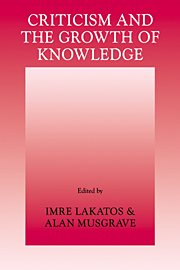 Criticism and the Growth of Knowledge
Criticism and the Growth of Knowledge Book contents
- Frontmatter
- Contents
- Preface
- Note on the Third Impression
- Logic of Discovery or Psychology of Research?
- Against ‘Normal Science’
- Does the Distinction between Normal and Revolutionary Science Hold Water?
- Normal Science, Scientific Revolutions and the History of Science
- Normal Science and its Dangers
- The Nature of a Paradigm
- Falsification and the Methodology of Scientific Research Programmes
- Consolations for the Specialist
- Reflections on my Critics
- Index
- References
Does the Distinction between Normal and Revolutionary Science Hold Water?
Published online by Cambridge University Press: 05 August 2014
- Frontmatter
- Contents
- Preface
- Note on the Third Impression
- Logic of Discovery or Psychology of Research?
- Against ‘Normal Science’
- Does the Distinction between Normal and Revolutionary Science Hold Water?
- Normal Science, Scientific Revolutions and the History of Science
- Normal Science and its Dangers
- The Nature of a Paradigm
- Falsification and the Methodology of Scientific Research Programmes
- Consolations for the Specialist
- Reflections on my Critics
- Index
- References
Summary
Professor T. S. Kuhn's contribution to this Symposium can be looked at from two angles: either as a critique of Sir Karl Popper's approach towards the philosophy of science, in the light of its contrasts with Professor Kuhn's own views, or alternatively, as a further instalment in the development of Kuhn's analysis of the process of scientific change. My concern here is with the second of these two aspects. I shall draw attention to certain significant changes in the position Kuhn now appears to be occupying from those which he adopted, first in his original paper on ‘The Function of Dogma in Scientific Research’ read at Worcester College, Oxford, in 1961, and subsequently in his book The Structure of Scientific Revolutions published in 1962. And in the light of changes, I shall suggest how we might see our way beyond Kuhn's theory of ‘scientific revolution’ to a more adequate theory of scientific change.
The great merit of Professor Kuhn's insistence on the ‘revolutionary’ character of some changes in scientific theory is that it has compelled many people to face for the first time the full profundity of the conceptual transformations which have, at times, marked the historical development of scientific ideas. Yet from the beginning it was clear to many onlookers that Kuhn's original statement of his position was, in at least two respects, only provisional. Some of us have been waiting with interest to see in what direction his own intellectual development took him next.
- Type
- Chapter
- Information
- Criticism and the Growth of KnowledgeProceedings of the International Colloquium in the Philosophy of Science, London, 1965, pp. 39 - 48Publisher: Cambridge University PressPrint publication year: 1970
References
- 58
- Cited by


